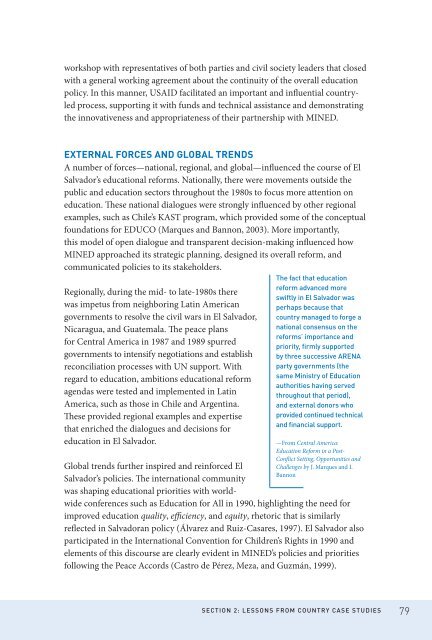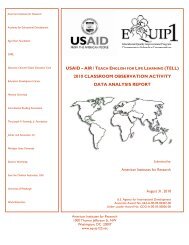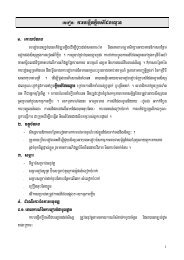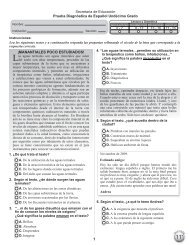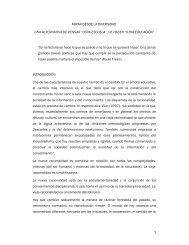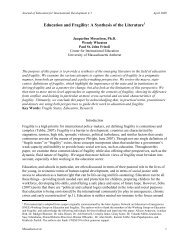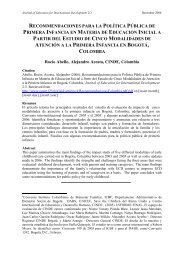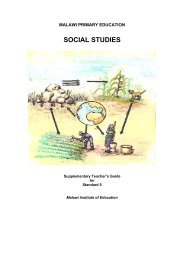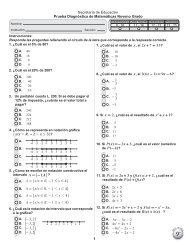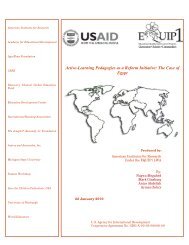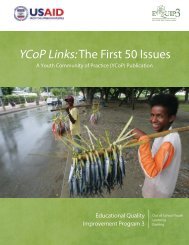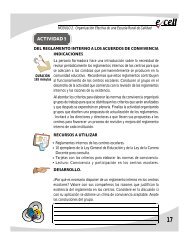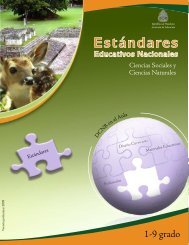The Power of Persistence: Education System ... - EQUIP123.net
The Power of Persistence: Education System ... - EQUIP123.net
The Power of Persistence: Education System ... - EQUIP123.net
Create successful ePaper yourself
Turn your PDF publications into a flip-book with our unique Google optimized e-Paper software.
workshop with representatives <strong>of</strong> both parties and civil society leaders that closed<br />
with a general working agreement about the continuity <strong>of</strong> the overall education<br />
policy. In this manner, USAID facilitated an important and influential countryled<br />
process, supporting it with funds and technical assistance and demonstrating<br />
the innovativeness and appropriateness <strong>of</strong> their partnership with MINED.<br />
ExTERNAL FORCES AND gLOBAL TRENDS<br />
A number <strong>of</strong> forces—national, regional, and global—influenced the course <strong>of</strong> El<br />
Salvador’s educational reforms. Nationally, there were movements outside the<br />
public and education sectors throughout the 1980s to focus more attention on<br />
education. <strong>The</strong>se national dialogues were strongly influenced by other regional<br />
examples, such as Chile’s KAST program, which provided some <strong>of</strong> the conceptual<br />
foundations for EDUCO (Marques and Bannon, 2003). More importantly,<br />
this model <strong>of</strong> open dialogue and transparent decision-making influenced how<br />
MINED approached its strategic planning, designed its overall reform, and<br />
communicated policies to its stakeholders.<br />
Regionally, during the mid- to late-1980s there<br />
was impetus from neighboring Latin American<br />
governments to resolve the civil wars in El Salvador,<br />
Nicaragua, and Guatemala. <strong>The</strong> peace plans<br />
for Central America in 1987 and 1989 spurred<br />
governments to intensify negotiations and establish<br />
reconciliation processes with UN support. With<br />
regard to education, ambitions educational reform<br />
agendas were tested and implemented in Latin<br />
America, such as those in Chile and Argentina.<br />
<strong>The</strong>se provided regional examples and expertise<br />
that enriched the dialogues and decisions for<br />
education in El Salvador.<br />
<strong>The</strong> fact that education<br />
reform advanced more<br />
swiftly in El Salvador was<br />
perhaps because that<br />
country managed to forge a<br />
national consensus on the<br />
reforms’ importance and<br />
priority, firmly supported<br />
by three successive ARENA<br />
party governments (the<br />
same Ministry <strong>of</strong> <strong>Education</strong><br />
authorities having served<br />
throughout that period),<br />
and external donors who<br />
provided continued technical<br />
and financial support.<br />
—From Central America:<br />
<strong>Education</strong> Reform in a Post-<br />
Conflict Setting, Opportunities and<br />
Challenges by J. Marques and I.<br />
Bannon<br />
Global trends further inspired and reinforced El<br />
Salvador’s policies. <strong>The</strong> international community<br />
was shaping educational priorities with worldwide<br />
conferences such as <strong>Education</strong> for All in 1990, highlighting the need for<br />
improved education quality, efficiency, and equity, rhetoric that is similarly<br />
reflected in Salvadoran policy (Álvarez and Ruiz-Casares, 1997). El Salvador also<br />
participated in the International Convention for Children’s Rights in 1990 and<br />
elements <strong>of</strong> this discourse are clearly evident in MINED’s policies and priorities<br />
following the Peace Accords (Castro de Pérez, Meza, and Guzmán, 1999).<br />
SECTION 2: lESSONS fROM COUNTRY CASE STUdIES<br />
79


